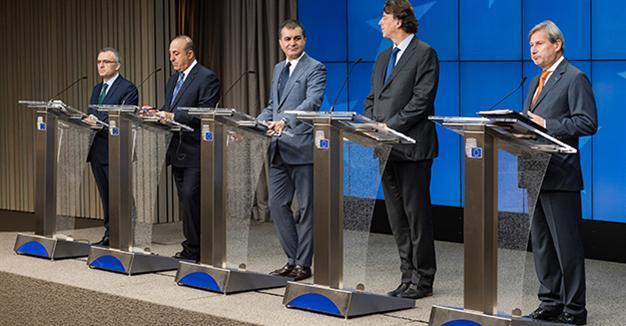Stalled process gains momentum as EU, Turkey open new membership chapter
BRUSSELS – Anadolu Agency

AP photo
Turkey’s stalled European Union membership process gained new momentum on June 30, as a new chapter on financial and budgetary provisions was opened amid soured relations after the bloc asked Ankara to change its anti-terror laws before granting Turks visa-free travel to the Schengen area.
Turkish Foreign Minister Mevlüt Çavuşoğlu, EU Minister and Chief Negotiator Ömer Çelik and Finance Minister Naci Ağbal joined a news conference held in Brussels on June 30 to announce the opening of Chapter 33, which usually opens when a candidate nears membership, according to Turkish EU Ambassador Selim Yenel.
The opening of the chapter was welcomed by European Commissioner for Neighborhood Policy and Enlargement Johannes Hahn as an indicator that the enlargement process with Turkey was “moving forward.”
Chapter 33 will be the 16th chapter to be opened as part of the country’s accession process. There are still five chapters being blocked by Greek Cyprus.
The revival of the process was one of Brussel’s promises to Ankara in return for its cooperation in stemming the flow of thousands of Syrians and non-Syrian refugees pouring into the bloc. As part of the March deal, the EU agreed to rekindle Turkey’s accession process, provide an additional 3 billion euros in aid and grant visa-free travel to Schengen countries for Turkish citizens.
The freshly launched chapter is the second to be opened in the last seven months, after Chapter 17 on economic and monetary policy was opened in Luxembourg on Dec. 14, 2015.
A total of 16 out of 35 chapters, one of which was provisionally closed, have been opened since the EU launched accession negotiations with Turkey on Oct. 3, 2005.
Çavuşoğlu praised the recent process as “historic,” highlighting that EU-Turkey summits were held over a period of four months, including summits held as part of the refugee deal.
Çavuşoğlu said cooperation with the EU extended into many fields and the refugee flow in the Aegean Sea had been “taken under control.”
“We succeeded in stopping deaths and the human traffic,” he added.
Less hopeful messages were conveyed after the chapter’s opening when the foreign minister of Slovakia, which will take over the reins of the EU’s rotating presidency on July 1, said they had no plans to open more membership talks with Turkey, after the beginning of negotiations on financial and budgetary issues.
Slovakian Foreign Minister Miroslav Lajcak told reporters in Bratislava on June 30 that “there is no prospect for further chapters,” adding that the EU and Turkey currently “differ over what chapters to open.”
President Recep Tayyip Erdoğan recently lashed out at Brussels for its treatment of Ankara, saying Turkey could hold a referendum to decide on whether to continue its accession process.
“We can stand up and ask the people just like the British are doing,” Erdoğan said in a speech late June 22 at a fast-breaking dinner, quoted by the state-run Anadolu Agency.
With the question of Turkey’s possible membership being raised in the British referendum, Ankara was angered by comments from London suggesting that it had no realistic chance of joining the bloc in the medium term.
During the campaign, U.K. Prime Minister David Cameron said Turkish membership was not “remotely on the cards” and may not happen until the year 3000.
